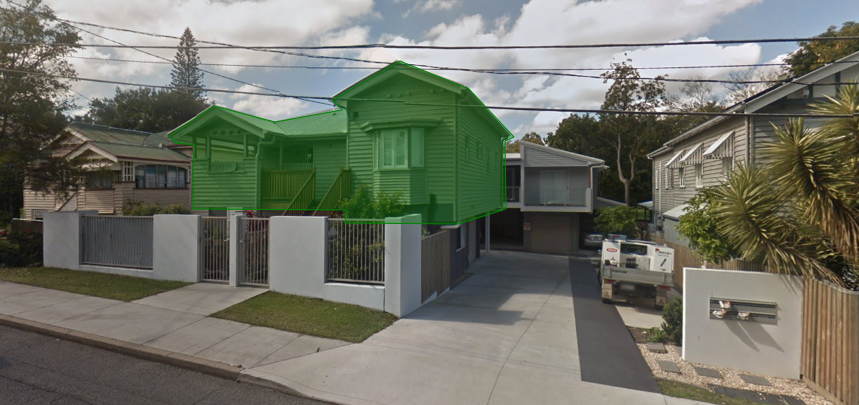You've done the learning. You've done your research. And now you've found a cracker of a development site. With a house on it. What now? Should you keep the house or get rid of it?
That's a question I get asked a lot, and the problem is, it falls into the "how long is a piece of string?" category of question. Because the answer is inevitably "it depends"...
So let's take a look at the various things "it depends" needs to tick off before you can make a decision...
To start with, there's really 3 angles to consider when answering this question, which boil down to - can, should or must I keep the house?
I'm going to start with MUST, because it's the most straightforward.
It Must Stay
Terminology is going to be different depending on which part of Australia you live in, but if the house has any sort of character or heritage order on it, potentially it could fall into the "tough, it has to stay" category.
So, what's the difference between character and heritage?
Character is often applied to an area where a whole lot of the houses were built around the same time with the same architecture. Two dates stand out in particular - 1911 and 1946. That's because the world wars essentially stopped home building in its tracks. And when men finally came back from the wars and houses started being built again, architecture and materials had moved on. So there were whole suburbs built with essentially the same style or "character". And local councils like to preserve that.
Heritage is even tougher - that's often specific to an individual house, and the restrictions on what you can do with the house are highly protective, even down to specific decorating colours and more.
Character is generally more focused on preserving the facade of the building, but gives you some flexibility behind the scenes. Heritage is the entire building. Either way, these types of protection may eliminate the "can" and "should" options right upfront.

Can It Stay?
This boils down to - is it in the way? Is it physically located in the right spot on the block for you to be able to go ahead and execute your chosen strategy?
Keeping an existing house is often a real boost to your feasibility, because houses generally have intrinsic value. It's almost always cheaper to renovate an existing house than it is to knock it down and build a new one. Even without renovating, selling the existing house "as is" on a smaller block will most likely sell for more than a vacant lot, and so help profitability. There's also the time factor of rebuilding.
So take a look at the whole property and see what your options are. If the house is on one side of the block, is the frontage wide enough to give you 2 properties side-by-side, with the existing house on one of them? If not, is there currently enough room down one side of the property for you to reach the backyard, so you can create a battle axe situation - existing house in the front, new lot or lots in the back? Remember to factor in whether an existing carport or garage that's separate to the house could be demolished to create access.
Another option is to consider whether the house could be moved within the property. For example, moved closer to one boundary or the other, opening up space for a second side-by-side lot or driveway access. This is commonly called a "slider". You can even get creative and do things like slide the house across and then lift it up, giving room to create new living space underneath.
 Should it Go?
Should it Go?
If you can't find a way to make the existing house work on the site, then you've probably already answered this question (assuming the house doesn't fall into the MUST stay category).
But before you call out the bulldozers, there's more than one way to say bye bye to the existing house. Take the time to consider whether the house is suitable for relocation. First up - is it on stumps or a slab? If it's on a slab, demolishing is the disposal method of choice. But if it's on stumps - keep asking questions.
The ‘ins and outs’ along with the costs of relocating a house are a topic all by themselves, but here are a few things to consider:
If it all sounds too hard, another option is to sell the house or even give it away to a removalist company, or somebody else who is willing to spend the time and money needed to make it happen. Remember, though, that moving a house doesn't happen in the blink of an eye, so you have to factor that delay into any other plans you have for the site.
And if it all just sounds too hard and you just want to demolish, pause and consider whether any parts of the house can be recycled. Even if you give bits and pieces away for free to anyone who's willing to strip them out of the house and take them away, you can potentially reduce the cost and time of demolition because there's less on site to remove.
I Still Don't Know What To Do!
Now that your head is spinning and you're still unsure whether the existing house should stay or go, there's one final piece to the puzzle - the numbers. In the end, although I've given you lots of options here, like most things in Property Development the answer comes back to the numbers.
Do multiple feasibilities, testing out the costs and potential for each scenario, and the one that gives the best outcome is the one you should put at the top of your list.
That's a question I get asked a lot, and the problem is, it falls into the "how long is a piece of string?" category of question. Because the answer is inevitably "it depends"...
So let's take a look at the various things "it depends" needs to tick off before you can make a decision...
To start with, there's really 3 angles to consider when answering this question, which boil down to - can, should or must I keep the house?
I'm going to start with MUST, because it's the most straightforward.
It Must Stay
Terminology is going to be different depending on which part of Australia you live in, but if the house has any sort of character or heritage order on it, potentially it could fall into the "tough, it has to stay" category.
So, what's the difference between character and heritage?
Character is often applied to an area where a whole lot of the houses were built around the same time with the same architecture. Two dates stand out in particular - 1911 and 1946. That's because the world wars essentially stopped home building in its tracks. And when men finally came back from the wars and houses started being built again, architecture and materials had moved on. So there were whole suburbs built with essentially the same style or "character". And local councils like to preserve that.
Heritage is even tougher - that's often specific to an individual house, and the restrictions on what you can do with the house are highly protective, even down to specific decorating colours and more.
Character is generally more focused on preserving the facade of the building, but gives you some flexibility behind the scenes. Heritage is the entire building. Either way, these types of protection may eliminate the "can" and "should" options right upfront.
Can It Stay?
This boils down to - is it in the way? Is it physically located in the right spot on the block for you to be able to go ahead and execute your chosen strategy?
Keeping an existing house is often a real boost to your feasibility, because houses generally have intrinsic value. It's almost always cheaper to renovate an existing house than it is to knock it down and build a new one. Even without renovating, selling the existing house "as is" on a smaller block will most likely sell for more than a vacant lot, and so help profitability. There's also the time factor of rebuilding.
So take a look at the whole property and see what your options are. If the house is on one side of the block, is the frontage wide enough to give you 2 properties side-by-side, with the existing house on one of them? If not, is there currently enough room down one side of the property for you to reach the backyard, so you can create a battle axe situation - existing house in the front, new lot or lots in the back? Remember to factor in whether an existing carport or garage that's separate to the house could be demolished to create access.
Another option is to consider whether the house could be moved within the property. For example, moved closer to one boundary or the other, opening up space for a second side-by-side lot or driveway access. This is commonly called a "slider". You can even get creative and do things like slide the house across and then lift it up, giving room to create new living space underneath.
If you can't find a way to make the existing house work on the site, then you've probably already answered this question (assuming the house doesn't fall into the MUST stay category).
But before you call out the bulldozers, there's more than one way to say bye bye to the existing house. Take the time to consider whether the house is suitable for relocation. First up - is it on stumps or a slab? If it's on a slab, demolishing is the disposal method of choice. But if it's on stumps - keep asking questions.
The ‘ins and outs’ along with the costs of relocating a house are a topic all by themselves, but here are a few things to consider:
- the condition of the house
- site access for removal
- roofing materials - some are better than others
- how many pieces would the house need to be cut up into for removal
- is there asbestos in the house
If it all sounds too hard, another option is to sell the house or even give it away to a removalist company, or somebody else who is willing to spend the time and money needed to make it happen. Remember, though, that moving a house doesn't happen in the blink of an eye, so you have to factor that delay into any other plans you have for the site.
And if it all just sounds too hard and you just want to demolish, pause and consider whether any parts of the house can be recycled. Even if you give bits and pieces away for free to anyone who's willing to strip them out of the house and take them away, you can potentially reduce the cost and time of demolition because there's less on site to remove.
I Still Don't Know What To Do!
Now that your head is spinning and you're still unsure whether the existing house should stay or go, there's one final piece to the puzzle - the numbers. In the end, although I've given you lots of options here, like most things in Property Development the answer comes back to the numbers.
Do multiple feasibilities, testing out the costs and potential for each scenario, and the one that gives the best outcome is the one you should put at the top of your list.
